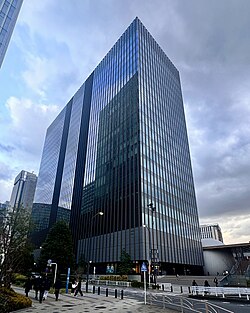
Back إيسوزو Arabic ايسوزو ARZ Isuzu Azerbaijani ایسوزو AZB Isuzu Byelorussian Исузу Bulgarian ইসুজু Bengali/Bangla Isuzu Catalan Isuzu Czech Isuzu Danish
 Headquarters at Yokahama Gate Tower in Yokohama, Kanagawa Prefecture | |
Native name | いすゞ自動車株式会社 |
|---|---|
Romanized name | Isuzu Jidōsha Kabushiki-gaisha |
| Company type | Public |
| TYO: 7202 TOPIX Large 70 Component | |
| Industry | Manufacturing |
| Founded | 30 March 1934 (as Isuzu) |
| Headquarters | Yokohama Gate Tower, Nishi-ku, Yokohama, , Japan |
Area served | Worldwide |
Key people | Masanori Katayama (Chairman, CEO & Representative Director) Shinsuke Minami (President, COO & Representative Director) |
| Products | Commercial vehicles Diesel engines Diesel generators Passenger cars (until 2002)[1] |
| Revenue | |
| Total assets | |
| Total equity | |
Number of employees | 8,056 (44,495 consolidated) |
| Subsidiaries | |
| Website | www |
Isuzu Motors Ltd. (Japanese: いすゞ自動車株式会社, Hepburn: Isuzu Jidōsha Kabushiki-Kaisha), commonly known as Isuzu (Japanese pronunciation: [isɨᵝzɨᵝ], /iˈsuzu/), is a Japanese multinational automobile manufacturer headquartered in Yokohama, Kanagawa Prefecture. Its principal activity is the production, marketing and sale of Isuzu commercial vehicles and diesel engines.
The company also has a number of subsidiaries and joint ventures, including UD Trucks, Anadolu Isuzu (a Turkish joint venture with Anadolu Group), Sollers-Isuzu (a Russian joint venture with Sollers JSC - Production stopped in March 2022, Isuzu stake transferred to Sollers in July 2023[2]), SML Isuzu (an Indian venture formerly known as Swaraj Mazda), Jiangxi Isuzu Motors (a Chinese joint venture with Jiangling Motors Company Group), Isuzu Astra Motor Indonesia, Isuzu Malaysia (Isuzu HICOM), Industries Mécaniques Maghrébines, Isuzu UK, Isuzu South Africa, Isuzu Philippines, Taiwan Isuzu Motors, Isuzu Vietnam, Isuzu Motors India and BYD Isuzu.
Isuzu has assembly and manufacturing plants in Fujisawa, which have been there since the company was founded under earlier names, as well as in the Tochigi and Hokkaidō prefectures. Isuzu-branded vehicles are sold in most commercial markets worldwide. Isuzu's primary market focus is on commercial diesel-powered truck, buses and construction.
Named after the Isuzu River, the kanji of Isuzu (五十鈴) mean "fifty bells".
- ^ Jackson, Kathy (4 February 2008). "Isuzu's collapse". Automotive News. Crain Communications, Inc. Archived from the original on 10 October 2019.
- ^ "Из России ушел еще один японский автопроизводитель". Banki.ru (in Russian). 14 July 2023.
© MMXXIII Rich X Search. We shall prevail. All rights reserved. Rich X Search